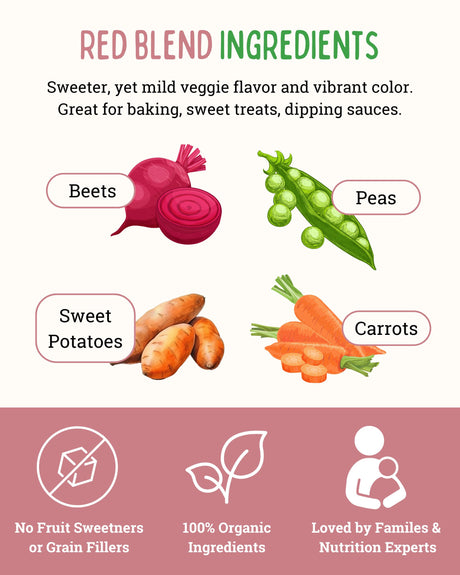Addressing Picky Eater Challenges
Dealing with picky eaters is a familiar struggle for many parents and caregivers.
It's not uncommon for children to exhibit selective eating habits, turning their noses up at certain foods and causing frustration during mealtime.
Impact on Family Dynamics

The impact of picky eating extends beyond just the dinner table. It can disrupt family mealtime dynamics, leading to stress, tension, and even conflict among family members.
Parents often find themselves walking a fine line between encouraging their child to eat a balanced diet and avoiding mealtime battles.
What to do about picky eaters
In this blog, we aim to provide practical strategies and tips for navigating the challenges of picky eating. Whether you're a seasoned parent or a new caregiver, our goal is to equip you with the tools you need to make mealtimes more enjoyable and nutritious for the whole family.
Let's dive into some actionable advice to help you conquer picky eater problems.
Understanding Picky Eating
Defining Picky Eating

Picky eating refers to a child's reluctance or refusal to try new foods or eat certain types of food. It's important to distinguish between typical picky eating, which is a common phase in childhood development, and problematic picky eating, which may indicate underlying issues.
Exploring Possible Reasons
There are various reasons why children exhibit picky eating behaviors. Sensory issues, such as texture aversion or sensitivity to certain tastes, can play a significant role.
Additionally, neophobia, the fear of new foods, and issues related to control and autonomy can contribute to picky eating habits.
Understanding Consequences
While picky eating is often seen as a phase, prolonged picky eating can have consequences for children's health and well-being. Nutritional deficiencies, limited food variety, and disrupted mealtime patterns can impact growth and development, as well as emotional well-being.
It's essential to address picky eating early to prevent these consequences from occurring.
Creating a Positive Mealtime Environment
Emphasizing Relaxation and Positivity
A relaxed and positive atmosphere during meals is crucial for fostering healthy eating habits in children. When children feel pressured or stressed during mealtimes, they may become more resistant to trying new foods or enjoying the dining experience.
Creating a calm and welcoming environment can help children feel more comfortable and open to exploring different foods.
Reducing Mealtime Stress
To reduce mealtime stress, parents can implement several strategies. Avoiding power struggles over food, offering choices within healthy options, and maintaining consistent mealtime routines can help alleviate tension.
It's essential to approach mealtimes with patience and flexibility, understanding that children may have varying preferences and appetites from day to day.
Role of Parents and Caregivers
Parents and caregivers play a significant role in shaping kids’ attitudes toward food and eating. By modeling positive eating behaviors and attitudes, adults can influence children to develop healthy eating habits.
Demonstrating enjoyment of a variety of foods, involving children in meal planning and preparation, and refraining from making negative comments about food can all contribute to creating a positive mealtime environment.
Introducing Variety and Exploration
Gradually Introducing New Foods
One effective strategy for dealing with picky eaters is to gradually introduce new foods and flavors into their diets. Start by offering small portions of new foods alongside familiar favorites. Encourage children to explore and taste new foods without pressure or coercion.
Over time, as children become more accustomed to seeing and tasting new foods, they may become more willing to try them.
Involving Children in Meal Planning and Preparation

Involving kids in meal planning and preparation can increase their interest and excitement about trying new foods. Allow children to choose a vegetable or fruit to include in a meal or snack, and let them help with age-appropriate tasks in the kitchen, such as washing produce or stirring ingredients.
When children feel involved in the mealtime process, they may be more inclined to try new foods and flavors.
Making Mealtime Exploration Fun and Engaging
Making mealtime exploration fun and engaging can help children develop a positive attitude toward trying new foods. Create themed meals or snack platters based on colors, shapes, or countries of origin.
Use cookie cutters to shape fruits and vegetables into fun shapes, or arrange food items into creative designs on the plate. Encourage children to use their senses to explore different textures, colors, and flavors, turning mealtime into an exciting sensory experience.
Managing Food Refusals and Respecting Preferences
Addressing Common Challenges
Dealing with food refusals and mealtime battles can be one of the most challenging aspects of parenting, especially when it comes to picky eaters. It's common for children to express reluctance or refusal toward certain foods, leading to frustration and stress for parents.
Understanding the root causes behind these refusals is key to finding effective solutions and fostering a positive mealtime environment.
Respecting Kids’ Food Preferences
While it's important to encourage children to try new foods and expand their palates, it's equally important to respect their food preferences to some extent. Pressuring kids to eat foods they dislike can backfire, leading to increased resistance and negative associations with mealtime. Instead, parents can offer a variety of nutritious options and allow children to choose what they want to eat from those choices, empowering them to make their own decisions about food.
Techniques for Handling Food Aversions
Handling food aversions and sensory issues with sensitivity is crucial for creating a supportive mealtime environment. Parents can implement strategies such as food chaining, which involves gradually introducing new foods that are similar in taste or texture to familiar ones.
Additionally, using positive reinforcement, praise, and encouragement can help kids feel more comfortable and confident trying new foods. It's also important to be patient and understanding, recognizing that progress may take time and consistency.
Creative Meal Planning and Preparation
Creative Meal Ideas for Picky Eaters

Finding creative meal ideas that cater to picky eaters' preferences can help make mealtimes more enjoyable for the whole family. One strategy is to offer familiar foods alongside new ones, gradually introducing them into the meal.
For example, parents can create build-your-own taco or pizza nights, allowing kids to customize their meals with toppings they enjoy. Another approach is to reinvent classic favorites with a healthier twist, such as swapping traditional pasta for zucchini noodles or cauliflower rice.
Sneaking in Nutritious Ingredients
Sneaking in nutritious ingredients is a clever way to boost the nutritional value of meals without children noticing. Parents can puree vegetables like spinach, carrots, or cauliflower and add them to sauces, soups, or smoothies. This not only adds vitamins and minerals but also enhances the flavor and texture of the dish.
Easy Peasie Veggie Powders is another easy way to veggie-up any meal, snack, or smoothie. Effortlessly and discreetly add vegetable powder blends to any recipe.
Additionally, incorporating whole grains, beans, and lean proteins into family-favorite recipes can provide a nutrient-rich meal while still satisfying picky eaters' tastes.
Involving Picky Eaters in Meal Preparation
Involving picky eaters in meal planning and preparation can increase their investment in the meal and make them more likely to try new foods. Parents can engage children by letting them choose recipes, pick out ingredients at the grocery store, or assist with simple tasks like washing vegetables or stirring ingredients.
By making mealtime a collaborative and enjoyable experience, parents can encourage a positive attitude toward trying new foods.
Positive Reinforcement and Rewards
Benefits of Positive Reinforcement
Positive reinforcement and rewards can be effective tools for encouraging picky eaters to try new foods. Praising kids for their willingness to taste unfamiliar foods can boost their confidence and motivation to explore different flavors and textures.
By associating trying new foods with positive experiences, children may develop a more adventurous palate over time. Additionally, positive reinforcement helps create a supportive and encouraging mealtime environment, where children feel empowered to make healthy choices.
Ideas for Non-Food Rewards
While offering food rewards for trying new foods may seem intuitive, non-food rewards can be equally motivating and promote a positive relationship with food. Parents can consider rewards such as extra playtime, stickers, or choosing the next family activity.
Non-food rewards not only encourage adventurous eating but also reinforce the idea that trying new foods is a positive behavior worthy of recognition. Moreover, these rewards can help children associate mealtime with enjoyable experiences beyond just the food itself.
Seeking Professional Help
Knowing When to Seek Assistance
Recognizing when to seek help from healthcare professionals or registered dietitians is crucial for addressing persistent picky eating. If picky eating significantly impacts a child's growth, development, or overall well-being, seeking professional guidance is warranted.
Additionally, if efforts to address picky eating at home have been unsuccessful or if parents have concerns about their child's nutritional intake, consulting with a professional can provide valuable insights and support.
Role of Healthcare Professionals
Healthcare professionals and registered dietitians play a vital role in assessing and addressing picky eating in children. They can conduct thorough evaluations to identify underlying causes of picky eating, such as sensory issues, nutritional deficiencies, or feeding disorders.
With their expertise, professionals can develop personalized strategies and interventions tailored to the child's specific needs, helping parents navigate mealtime challenges more effectively.
Finding Qualified Professionals and Support
Finding qualified professionals and support groups can empower parents in managing picky eating issues. Parents can seek referrals from pediatricians or family doctors to connect with registered dietitians specializing in pediatric nutrition.
Online directories or professional organizations may also provide listings of certified practitioners experienced in addressing picky eating. Additionally, joining support groups or online communities for parents of picky eaters can offer valuable guidance, shared experiences, and encouragement throughout the journey.
Patience and Persistence
Importance of Patience
Patience is key when dealing with picky eating, as progress often takes time and consistency. It's essential for parents to understand that changing eating habits is a gradual process and may not happen overnight.
By approaching mealtime challenges with patience, parents can create a supportive environment that encourages exploration and acceptance of new foods without pressure or stress.
Reassurance for Parents
Parents may feel frustrated or discouraged when their efforts to address picky eating don't yield immediate results. However, it's important to reassure them that progress is possible, even if it's slow.
Every small step towards expanding a child's food repertoire is a success worth celebrating, and with continued patience and persistence, positive changes can occur over time.
Encouragement to Stay Committed
Staying committed to helping picky eaters develop healthier eating habits is crucial for long-term success. Encouragement and support from parents can make a significant difference in a child's willingness to try new foods and become more adventurous eaters.
By remaining patient, persistent, and positive, parents can create a positive mealtime environment that fosters healthy eating habits and promotes a positive relationship with food.
Key Strategies for Handling Mealtime Challenges
In dealing with picky eaters, creating a positive mealtime environment, introducing variety, and respecting food preferences are vital strategies. Parents can gradually introduce new foods, involve kids in meal preparation, and offer creative meal options to encourage exploration and acceptance.
It's also important to manage food refusals with sensitivity and patience, using positive reinforcement and rewards to motivate adventurous eating.
Importance of Patience and Consistency
Patience, consistency, and positive reinforcement play crucial roles in addressing picky eating. Parents should approach mealtime challenges with patience, understanding that progress may be slow but achievable.
Consistently exposing children to new foods and reinforcing positive eating behaviors can help them develop healthier habits over time.
Encouragement for Implementation
Parents are encouraged to implement the provided strategies in handling mealtime challenges with picky eaters. By fostering a positive mealtime environment, staying patient and consistent, and seeking professional help if needed, progress can be made.
It's important to remember that addressing picky eating takes time and effort, but with dedication and support, positive changes can occur.
Leave your comments below; we love to hear from you! And don't forget to follow EasyPeasie for more veggie info and convo on YouTube, Facebook, and Instagram! ~ThePeas













